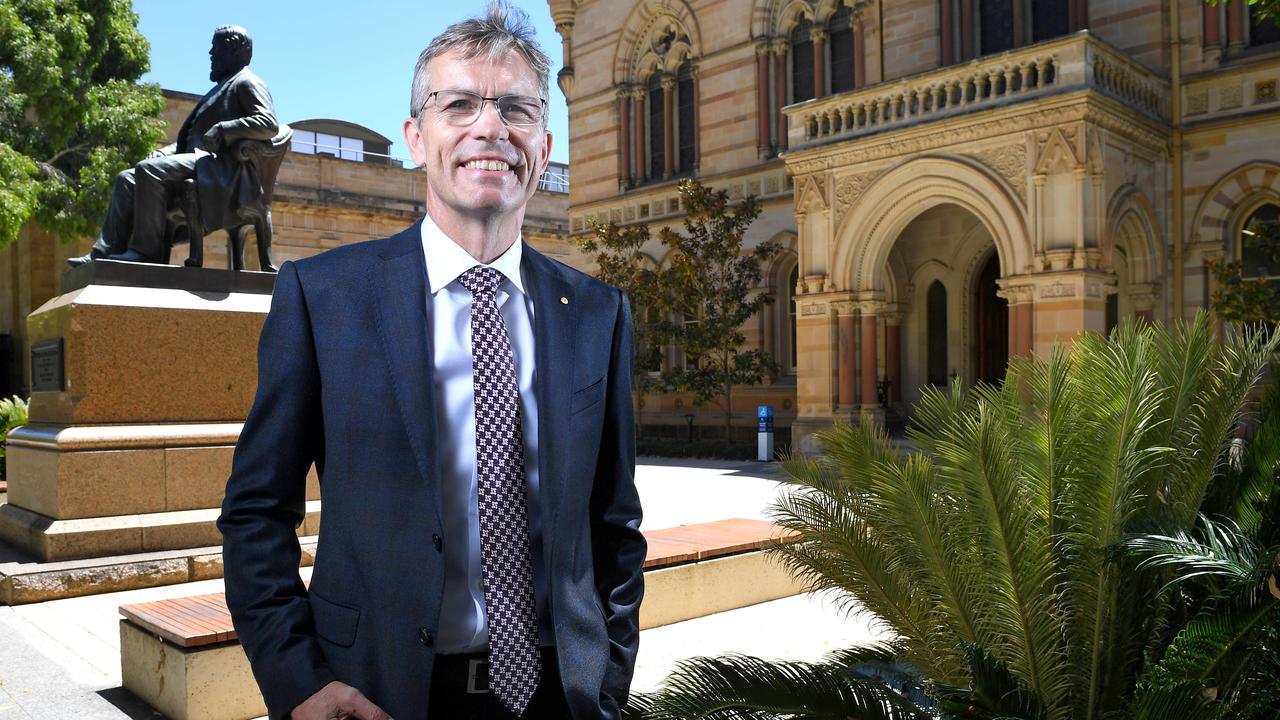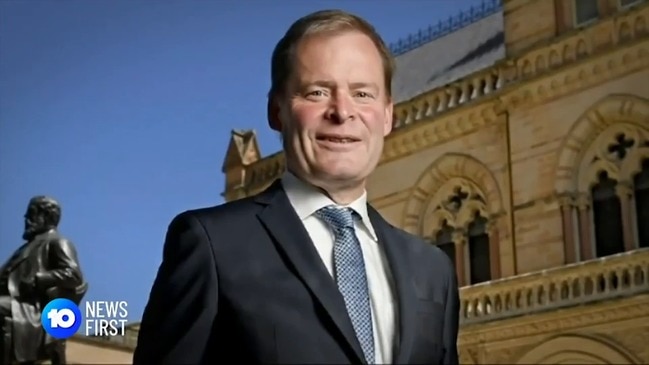Peter Hoj appointed new vice-chancellor of University of Adelaide after Peter Rathjen scandal
Adelaide Uni’s new vice-chancellor has vowed to rebuild after the former head, Peter Rathjen, resigned just before the release of a damning ICAC report.

Rebuilding a positive culture at Adelaide University and shoring up its finances while clouds hang over international student enrolments are major tasks for new vice-chancellor Peter Hoj.
Healing from the shock of cultural problems exposed by the Independent Commissioner Against Corruption will need the university’s leaders to act and not just talk, Prof Hoj said.
And if the international student intake does not recover, the broader South Australian economy will suffer and the unis may need to speed up consideration of mergers.
Danish-born Prof Hoj’s appointment was announced on Tuesday. He returns to South Australia where he was formerly vice-chancellor of UniSA and held senior academic positions at Adelaide University.
“There’s a lot of work to be done,” Prof Hoj said in response to ICAC reports on the behaviour of disgraced former vice-chancellor Peter Rathjen and on staff views about integrity at the university.
“The university is already deep in planning initiatives to roll out.
“My first priority will be to engage deeply with our community – students, staff, alumni, government and business.
“We need a direction of travel that will make this a better place to work, but it is not something that can be done overnight.
“There is no magic potion but the leadership must demonstrate what is the right thing to do.
“People rarely listen to what you say, they always observe what you do.
“People have to see change in practice not just read an aspirational document.”

Most recently, Prof Hoj was vice-chancellor at Queensland University from 2012 to 2020 – a post he took up after that university was engulfed in controversy leading to leadership resignations over the enrolment of the vice-chancellor’s daughter in medicine when she did not meet admission criteria.
“It took a couple of years for people to look forward and not back to that,” he said.
In recognition there are too few women in leadership in most sectors, Prof Hoj would refuse to appear on panels of all men.
“Just tell them Peter’s not coming,” he instructed staff to respond to such invitations.
In the immediate term, Adelaide University will need to deal with the issue of international students not being allowed to travel to Australia.
Prior to the coronavirus pandemic, one third of the university’s students were international, providing $255m of the $991m total revenue.
Universities, including Adelaide, had developed the international student market because “you cannot run a world-class, research-intensive university on the funding available from government”, Prof Hoj said.
“It’s not a fair criticism that universities became too reliant on it because there was broad agreement that it is a magnificent export earner,” he said.
Moreover, the “soft power” advantage to Australia of having thousands of its graduates living and working in the countries of our region should not be underestimated.
The largest intake of students had been from China because that country’s economy was strong enough to afford to send its young people abroad to pay high fees and living costs.
Prof Hoj said all universities were trying to diversify, but education was by no means alone in China being its biggest partner. Wine, wool, resources and other sectors faced the same issue.
Nor were universities alone in feeling the pinch now from restrictions on students with accommodation, retail and tourism all hit.
If recovery of international enrolments stalled, it could expedite SA’s universities to consider mergers, he said.
Prof Hoy left UniSA in 2012 after then merger discussions failed.
A further merger bid failed in 2018.

However, it has remained on the radar with Chancellor Catherine Branson and UniSA vice-chancellor David Lloyd saying it should be discussed.
Prof Hoj strongly advocated for a merger when at UniSA but as he had not started his term at Adelaide it was too early to declare a position.
“It’s important to realise a vice-chancellor would never determine whether a merger would go ahead,” he said.
“That determination is a matter for the board who will then task the vice-chancellor to do some leg work.
“I haven’t had those discussions yet.”
There would need to be due diligence into what was in the best interests of the university and the state.
All three universities in SA were now financially viable.
“So we don’t have a burning platform,” he said of the urgency of talks.
“However, if we have a situation where international student education doesn’t come back to Australia in comparable levels to what it was, then some very hard questions will have to be asked about how we resource ourselves differently.”
In that case, economies of scale could be needed.
Prof Hoj said universities should be “very appreciative” that the Federal Government boosted research funding by $1bn this financial year.
“Going forward, if we want an economy that does diversify and does produce things the world wants to buy, we need to retain that research effort,” he said.
“If international student flows do not return, I believe the Government should be encouraged to make that billion-dollar boost for research permanent in annual Budgets.”
Prof Hoj will take the reins at Adelaide on February 8 for a five-year term.
He will replace interim vice-chancellor Mike Brooks who has been running the university since former vice-chancellor Peter Rathjen resigned shortly before a damning report by the Independent Commissioner Against Corruption into his behaviour.

Ms Branson said Prof Hoj was “one of Australia’s most outstanding and highly respected leaders in higher education”.
“Peter is an inspiring leader with an outstanding track record, driving success at a national and international level, building university rankings and research output, with his focus on a high-quality, student-centred approach to the teaching and learning experience, and employer satisfaction with graduates,” she said.
Prof Hoj has a Companion of the Order of Australia (AC) award for services to education and science.
He was a member of the Federal Government’s University Foreign Interference Taskforce.
Prof Hoj’s salary package will be revealed in the university’s annual report.
A spokesman said it would be “the lowest” among earnings of the three vice-chancellors in SA and less than was paid to Mr Rathjen, who received about $1.1m in 2019.
Group of Eight universities chief executive Vicki Thomson welcomed the appointment saying Prof Hoj was “a research leader who is right for the time”.
The student representative council planned to hold a rally on Wednesday about the appointment but Adelaide University Union president Chuyue Qin welcomed the end of the uncertainty and looked forward to working with Prof Hoj.
Adelaide’s branch president of the National Tertiary Education Union, Nick Warner, expressed “disappointment” there had not been more consultation but said the focus remained on constructive engagement.
Some 200 staff have left the university through attrition and voluntary redundancies.
Prof Hoj said his ambition was to protect staff but acknowledged external events precluded any guarantees.
At Queensland University, Prof Hoj faced criticism over links to China.
There also was controversial disciplinary action against a student, Drew Pavlou, who organised anti-Chinese rallies which turned violent.
Prof Hoj did not sit on the disciplinary panels and an appeal process, after Prof Hoj left the university, found Mr Pavlou had committed serious misconduct and that his suspension was not related to his political views.
The appeal outcome “should finally put to rest the false allegations that this process has been an attack on freedom of expression,” chancellor Peter Varghese said at the time.
At Queensland University, Prof Hoj led improvements in research rankings, brought the budget to surplus, initiated a philanthropic campaign which raised $500m and grew scholarships.




